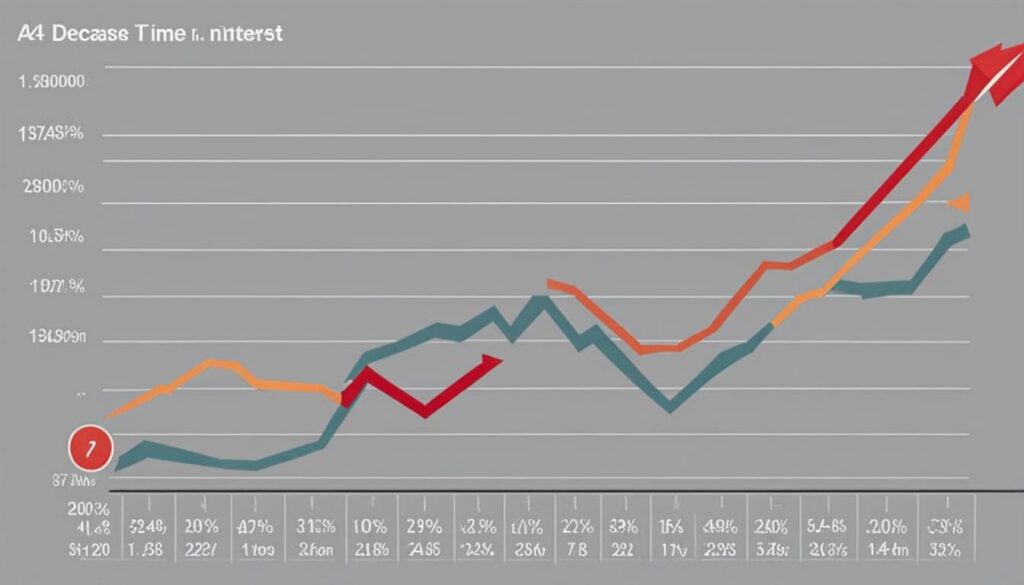Unlocking the Benefits of Improving Your Credit Score

Improving your credit score can have a significant impact on your financial well-being and open up a world of opportunities. A good credit score is not only a reflection of your creditworthiness but also brings a host of benefits that can enhance your financial stability and future prospects. Let’s explore the various ways in which improving your credit score can positively influence your life.
Key Takeaways:
- A good credit score makes it easier to secure affordable housing, transportation, and utility services.
- With a higher credit score, your chances of getting approved for loans and financing are improved.
- Having a good credit score can lead to lower interest rates and better loan terms.
- An improved credit score provides increased borrowing power and access to higher credit limits.
- A good credit score can result in lower insurance premiums and smaller security deposits.
Improving your credit score is within your control. By reviewing your credit reports, disputing errors, opening new credit accounts, and managing debt responsibly, you can build and maintain a positive credit history. Remember to pay your bills on time and understand the factors that affect your credit score. By taking these steps, you can unlock the financial benefits that come with a good credit score and secure your future.
What Are the Benefits of a Good Credit Score?
A good credit score can enhance your creditworthiness and provide you with a wide range of financial benefits. Having a strong credit history and a high credit score opens up opportunities and perks that may not be available to those with poor credit. Let’s take a closer look at some of the key advantages of having a good credit score.
🚨 TUIC Errors + Low Credit Score?
CreditScoreIQ helps you build credit faster by reporting utility bills to all 3 bureaus—while you dispute errors.
Start Building Credit Today →Access to Affordable Housing, Transportation, and Utilities
One of the major benefits of a good credit score is the ability to secure affordable housing, transportation options, and utility services. Landlords, lenders, and service providers often use credit scores to assess the risk of potential tenants or customers. With a good credit score, you are more likely to be approved for a lease or mortgage, allowing you to secure a safe and comfortable home. Additionally, having a good credit score can make it easier to qualify for lower interest rates on auto loans, allowing you to purchase reliable transportation. Utility companies may also offer better terms and lower deposits to individuals with good credit, saving you money in the long run.
Better Qualification Odds for Loans and Financing
Another advantage of a good credit score is the improved chances of getting approved for loans and financing. Whether you are looking to buy a car, start a business, or pursue higher education, having a good credit score increases your chances of being approved. Lenders are more likely to see you as a low-risk borrower and offer you better terms and interest rates. This can save you thousands of dollars over the life of a loan.
Lower Interest Rates and Better Loan Terms
A good credit score can also lead to lower interest rates and more favorable loan terms. When lenders see that you have a strong credit history, they are more willing to offer you competitive rates. This means you will pay less in interest over time, allowing you to save money and pay off your debt faster. Whether you are applying for a mortgage, a car loan, or a personal loan, having a good credit score can make a significant difference in the amount you pay.
Having a good credit score provides you with the financial freedom and flexibility to achieve your goals. It allows you to secure affordable housing, transportation, and utility services. Additionally, it increases your chances of getting approved for loans and financing, while also opening the door to lower interest rates and better loan terms. By understanding the factors that affect your credit score and taking steps to improve it, you can enjoy the numerous benefits that come with having good credit.
| Credit Score Range | Credit Rating |
|---|---|
| 800-850 | Excellent |
| 740-799 | Very Good |
| 670-739 | Good |
| 580-669 | Fair |
| 300-579 | Poor |
“A good credit score can make a significant difference in your financial life. It can open doors to better opportunities and save you money in the long run. Take the time to understand your credit, review your credit reports regularly, and take steps to improve your credit score. Your financial future will thank you.”

With a good credit score, you’ll have greater access to affordable housing, reliable transportation, and essential utility services. Your creditworthiness plays a significant role in determining whether landlords, lenders, and utility companies consider you a reliable and trustworthy customer. This means that having a higher credit score can make it easier for you to secure the housing, transportation, and utilities you need for a comfortable life.
When it comes to housing, a good credit score can make a difference in your ability to secure affordable options. Landlords often run credit checks on potential tenants to assess their financial responsibility and their ability to pay rent on time. A higher credit score indicates that you have a good track record of managing your finances, which can give landlords confidence in renting to you.
Similarly, your credit score can impact your access to reliable transportation. If you’re looking to finance a car or lease one, lenders will consider your credit score to assess your ability to make regular payments. A good credit score increases your chances of getting approved for financing or leasing options with favorable terms, making it easier to obtain the transportation you need.
Additionally, having a good credit score can also help you secure essential utility services. Utility companies, such as electricity, gas, and water providers, often check credit scores as part of their application process. A higher credit score demonstrates your reliability in managing financial obligations, increasing the likelihood of getting approved for utility services without requiring a hefty security deposit.

| BENEFITS OF A GOOD CREDIT SCORE |
|---|
| 1. Access to affordable housing |
| 2. Reliable transportation options |
| 3. Easier approval for utility services |
Having a good credit score opens up opportunities for secure, affordable housing, reliable transportation, and essential utility services. It’s important to maintain and improve your creditworthiness by paying bills on time, managing debt responsibly, and addressing any errors on your credit reports. By doing so, you can enjoy the benefits that come with a positive financial reputation and a strong credit score.
Better Qualification Odds for Loans and Financing
When your credit score improves, you’re more likely to qualify for loans and financing options. Lenders consider your credit score as an indication of your creditworthiness, which helps them assess the level of risk involved in lending you money. With a higher credit score, lenders are more confident in your ability to repay the borrowed amount, making them more likely to approve your loan application. This can be especially beneficial when you’re looking to make major purchases, such as buying a car or financing a home.
Having a good credit score not only increases your chances of loan approval but can also open doors to better interest rates and more favorable loan terms. Lenders offer lower interest rates to borrowers with good credit because they perceive them as less risky. This means you’ll end up paying less in interest over the life of your loan, saving you money in the long run. Additionally, favorable loan terms, such as longer repayment periods or flexible repayment options, can make it easier for you to manage your debt and achieve your financial goals.
It’s important to note that improving your credit score takes time and effort. It requires responsible financial behavior, such as paying your bills on time, managing your debt responsibly, and avoiding negative marks on your credit report. To boost your credit score, you can also consider taking steps like reviewing your credit reports, disputing any errors or inaccuracies, and opening new credit accounts to establish a positive credit history. Becoming an authorized user on a family member’s credit card can also help you build credit, as long as the primary cardholder has a good credit history.

Ultimately, having a good credit score can provide you with more financial opportunities and a positive reputation in the eyes of lenders. By actively working on improving your credit, you can increase your chances of qualifying for loans and financing, secure better interest rates, and ultimately achieve your financial goals. It’s never too late to start building good credit, so take the necessary steps today to unlock the benefits of a higher credit score.
Lower Interest Rates and Better Loan Terms
A strong credit score can save you money by securing lower interest rates and more favorable loan terms. When lenders assess your creditworthiness, they consider your credit score as an indication of how likely you are to repay your debts. A higher credit score demonstrates responsible financial behavior and reduces the perceived risk for lenders, making them more willing to offer you lower interest rates and better loan terms.
Lower interest rates can lead to significant savings over the life of a loan. For example, let’s say you’re looking to purchase a car and need to finance $20,000. With a good credit score, you may qualify for a 4% interest rate on a 5-year loan. This would result in monthly payments of approximately $368, and you would pay a total of $2,080 in interest over the term of the loan. However, if your credit score is lower and you only qualify for a 7% interest rate, your monthly payments would increase to around $396, and you would pay a total of $4,760 in interest.
In addition to lower interest rates, a good credit score can also lead to better loan terms. This means you may have more flexibility in negotiating aspects of the loan, such as the repayment period or any associated fees. With better terms, you can tailor the loan to better suit your financial situation and potentially save even more money.

- A higher credit score increases your chances of securing lower interest rates and better loan terms.
- Lower interest rates can result in significant savings over the life of a loan.
- Better loan terms provide more flexibility and the opportunity to tailor the loan to your needs.
| Credit Score | Interest Rate | Monthly Payment | Total Interest Paid |
|---|---|---|---|
| Good (4%) | 4% | $368 | $2,080 |
| Fair (7%) | 7% | $396 | $4,760 |
“A strong credit score not only saves you money but also enables you to secure better loan terms, giving you greater financial flexibility and control.”
– Financial Expert
Increased Borrowing Power and Higher Credit Limits
With a higher credit score, you’ll have greater borrowing power and access to higher credit limits. This can open up a world of opportunities when it comes to financing your dreams and achieving your goals.
When lenders see that you have a strong credit history and a good track record of managing your debt, they are more likely to trust you with larger loan amounts. This means that you can take out larger mortgages for your dream home, finance a new car with a higher loan amount, or even start a business with the capital you need.
Having access to higher credit limits can also provide you with a safety net in case of emergencies or unexpected expenses. It gives you the flexibility to handle financial challenges without having to rely on high-interest loans or credit cards with unfavorable terms.
| Benefits of Increased Borrowing Power and Higher Credit Limits |
|---|
| Opportunity to pursue larger financial goals |
| Greater flexibility during emergencies |
| Ability to secure favorable loan terms |
| Access to more options for financing |
By building and maintaining a good credit score, you can improve your chances of accessing these benefits. Remember to review your credit reports regularly, dispute any errors, and establish a positive credit history by opening new credit accounts and managing your debt responsibly. Paying your bills on time and keeping your credit utilization low are also crucial for maintaining a good credit score.

By taking these steps and consistently working towards improving your credit score, you can set yourself up for a brighter financial future. Whether it’s buying a home, starting a business, or simply enjoying the peace of mind that comes with financial stability, a higher credit score can pave the way to a world of opportunities.
Lower Insurance Premiums and Smaller Security Deposits
Maintaining a good credit score can help you save money on insurance premiums and reduce the size of your security deposits. Insurance companies consider your credit history when determining premiums for auto, home, and rental insurance. By demonstrating responsible credit behavior, such as paying bills on time and managing debt responsibly, you can show insurers that you are a low-risk customer. As a result, you may qualify for lower insurance premiums, ultimately saving you money in the long run.
“Having a good credit score can lead to significant savings on insurance premiums. Studies show that individuals with excellent credit scores pay up to 30% less for car insurance compared to those with poor credit scores.”
Furthermore, a good credit score can also lower the security deposits required for renting a property. Landlords often use your credit history as a measure of financial responsibility. If you have a higher credit score, you are seen as a lower-risk tenant, and landlords may request a smaller security deposit or waive it altogether. This can be particularly beneficial if you are moving to a new rental property and need to provide a security deposit upfront. Saving on security deposits can help you manage your moving expenses more effectively.
In summary, maintaining a good credit score can have a positive impact on your insurance premiums and security deposits. By practicing responsible credit habits and managing your finances wisely, you can enjoy lower insurance costs and reduce the financial burden of security deposits.
Table: Credit Score Ranges and Insurance Premium Impact
| Credit Score Range | Insurance Premium Impact |
|---|---|
| Excellent (720-850) | Up to 30% lower premiums |
| Good (680-719) | Moderate impact on premiums |
| Fair (580-679) | Higher premiums |
| Poor (300-579) | Significantly higher premiums |

Building and Maintaining Good Credit
Building and maintaining good credit requires a proactive approach, including reviewing your credit reports, disputing errors, opening new credit accounts, considering authorized user status, understanding credit score factors, paying bills on time, and managing debt responsibly.
One of the first steps to building good credit is reviewing your credit reports. By obtaining a copy of your credit reports from the three major credit bureaus – Equifax, Experian, and TransUnion – you can ensure the information is accurate and up to date. Look for any errors or discrepancies that could negatively impact your credit score and dispute them with the respective credit bureau.
Another way to improve your credit score is by opening new credit accounts. This shows lenders that you can responsibly handle credit and can positively impact your credit utilization ratio. However, it’s important to be selective and only open accounts that you truly need and can manage effectively. Additionally, consider becoming an authorized user on a family member’s credit card with a good payment history. This can help establish a positive credit history and boost your credit score.
Understanding the factors that affect your credit score is crucial for maintaining good credit. Payment history, credit utilization, length of credit history, types of credit, and new credit inquiries all play a role in determining your creditworthiness. By paying your bills on time and keeping your credit utilization low, you can improve your credit score over time. It’s also important to manage your debt responsibly by keeping balances low, avoiding late payments, and paying off debts as quickly as possible.
| Credit Score Factors | Impact |
|---|---|
| Payment History | High |
| Credit Utilization | High |
| Length of Credit History | Moderate |
| Types of Credit | Low |
| New Credit Inquiries | Low |
Building and maintaining good credit is an ongoing process that requires discipline and responsible financial habits. By following these strategies and taking a proactive approach to your credit, you can establish a strong credit foundation and enjoy the benefits that come with a good credit score.

Improving your credit score provides numerous benefits, including increased chances of loan approval, better interest rates, and the ability to secure your financial future. Having a good credit score opens up a world of opportunities and perks that can significantly impact your life and financial well-being.
One of the key advantages of a good credit score is the ability to secure affordable housing, transportation, and utility services. Landlords, lenders, and utility providers often rely on credit scores to assess creditworthiness, and a higher score can make it easier to access these essential services at more favorable terms and rates.
In addition, a good credit score improves your qualification odds for loans and financing. Whether you’re applying for a mortgage, an auto loan, or a personal loan, a higher credit score increases your chances of getting approved. This can save you money in the long run by allowing you to secure lower interest rates and better loan terms, ultimately reducing the cost of borrowing.
Furthermore, an improved credit score gives you increased borrowing power and the ability to access higher credit limits. Lenders are more likely to extend larger lines of credit to individuals with a good credit history, which can enable you to make significant purchases or handle unforeseen expenses with ease.
Your credit score also impacts your insurance premiums and security deposits. A good credit score can lead to lower insurance premiums, putting more money back in your pocket. Additionally, it can result in smaller security deposits when renting a property, making it more affordable to move into a new home or apartment.
To achieve and maintain a good credit score, it’s important to take proactive steps. Review your credit reports regularly to identify any errors or discrepancies that may be dragging down your score. Dispute any inaccuracies to ensure your credit report is an accurate reflection of your creditworthiness. Consider opening new credit accounts to demonstrate responsible credit management, and becoming an authorized user on a family member’s credit card can help boost your credit score.
Understanding the factors that affect your credit score is crucial. Make it a priority to pay your bills on time and manage your debt responsibly. These actions will have a positive impact on your credit score over time and help you maintain a solid financial reputation.
In conclusion, improving your credit score is an investment in your future. By unlocking the benefits of a higher credit score, you can increase your chances of loan approval, secure better interest rates, and pave the way for a more stable and prosperous financial future.
FAQ
What are the benefits of a good credit score?
A good credit score can provide numerous benefits, including easier access to affordable housing, transportation, and utility services. It can also improve your odds of qualifying for loans and financing, lead to lower interest rates and better loan terms, increase your borrowing power and credit limits, and result in lower insurance premiums and smaller security deposits.
How does a good credit score help with securing affordable housing, transportation, and utilities?
A good credit score makes it easier to secure affordable housing, transportation options, and utility services as it demonstrates your creditworthiness and reliability as a borrower. Landlords, lenders, and utility providers often review credit scores to assess the risk of potential tenants or customers, making a good credit score a valuable asset in these situations.
What are the improved qualification odds for loans and financing with a good credit score?
Having a good credit score increases your chances of getting approved for loans and financing. Lenders view a higher credit score as a sign of responsible financial behavior and are more likely to offer you favorable loan terms, such as lower interest rates and higher loan amounts.
How does a good credit score lead to lower interest rates and better loan terms?
A good credit score demonstrates your creditworthiness, indicating to lenders that you are less likely to default on loans. This reduced risk allows lenders to offer lower interest rates and more favorable loan terms, saving you money over the life of the loan.
What is the impact of a good credit score on borrowing power and credit limits?
A higher credit score increases your borrowing power and allows you to access higher credit limits. Lenders are more willing to extend credit to individuals with good credit scores, giving you the ability to borrow larger sums of money and potentially achieve your financial goals.
How does a good credit score result in lower insurance premiums and smaller security deposits?
Insurers often consider credit scores when determining insurance premiums. Those with higher credit scores are typically seen as less risky and may receive lower insurance premiums. Additionally, when renting a property, landlords may require smaller security deposits from individuals with good credit, as they are perceived as more reliable tenants.
What strategies can help in building and maintaining a good credit score?
To build and maintain a good credit score, it’s important to regularly review your credit reports for errors and dispute any inaccuracies. Opening new credit accounts and using them responsibly can also help improve your credit score. Another strategy is to consider becoming an authorized user on a family member’s credit card, which can potentially boost your credit score. Understanding the factors that affect your credit score, paying bills on time, and managing debt responsibly are also essential to building and maintaining good credit.
Why is it important to improve your credit score and secure your financial future?
Improving your credit score and securing your financial future can have numerous benefits. It improves your chances of loan approval, allows you to secure better interest rates and loan terms, and provides you with increased opportunities and financial flexibility. By taking control of your credit score, you can establish a solid financial reputation and open doors to a brighter future.
Ready to Improve Your Credit?
Disputing TUIC errors is step one. Step two? Boost your score by reporting utility payments with CreditScoreIQ.
Get Started Now (Only $1 Trial) →3-bureau reporting • $1M identity insurance • Dark web monitoring





